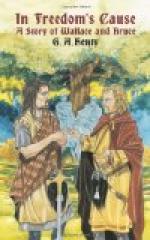Fearing that after this adventure he could no longer remain in safety with his uncle, Wallace left him and took up his abode in Lag Lane Wood, where his friends joining him, they lived a wild life together, hunting game and making many expeditions through the country. On one occasion he entered Ayr in disguise; in the middle of a crowd he saw some English soldiers, who were boasting that they were superior to the Scots in strength and feats of arms. One of them, a strong fellow, was declaring that he could lift a greater weight than any two Scots. He carried a pole, with which he offered, for a groat, to let any Scotchman strike him on the back as hard as he pleased, saying that no Scotchman could strike hard enough to hurt him.
Wallace offered him three groats for a blow. The soldier eagerly accepted the money, and Wallace struck him so mighty a blow that his back was broken and he fell dead on the ground. His comrades drew their swords and rushed at Wallace, who slew two with the pole, and when it broke drew the long sword which was hidden in his garments, and cut his way through them.
On another occasion he again had a fracas with the English in Ayr, and after killing many was taken prisoner. Earl Percy was away, and his lieutenant did not venture to execute him until his return. A messenger was sent to the Earl, but returned with strict orders that nothing should be done to the prisoner until he came back. The bad diet and foul air of the dungeon suited him so ill, after his free life in the woods, that he fell ill, and was reduced to so weak a state that he lay like one dead — the jailer indeed thought that he was so, and he was carried out to be cast into the prison burial ground, when a woman, who had been his nurse, begged his body. She had it carried to her house, and then discovered that life yet remained, and by great care and good nursing succeeded in restoring him. In order to prevent suspicion that he was still alive a fictitious funeral was performed. On recovering, Wallace had other frays with the English, all of which greatly increased his reputation throughout that part of the country, so that more adherents came to him, and his band began to be formidable. He gradually introduced an organization among those who were found to be friendly to the cause, and by bugle notes taken up and repeated from spot to spot orders could be despatched over a wide extent of country, by which the members of his band knew whether to assemble or disperse, to prepare to attack an enemy, or to retire to their fastnesses.
The first enterprise of real importance performed by the band was an attack by Wallace and fifty of his associates on a party of soldiers, 200 strong, conveying provisions from Carlisle to the garrison of Ayr. They were under the command of John Fenwick, the same officer who had been at the head of the troop by which Wallace’s father had been killed. Fenwick left twenty of his men to defend the wagons,




